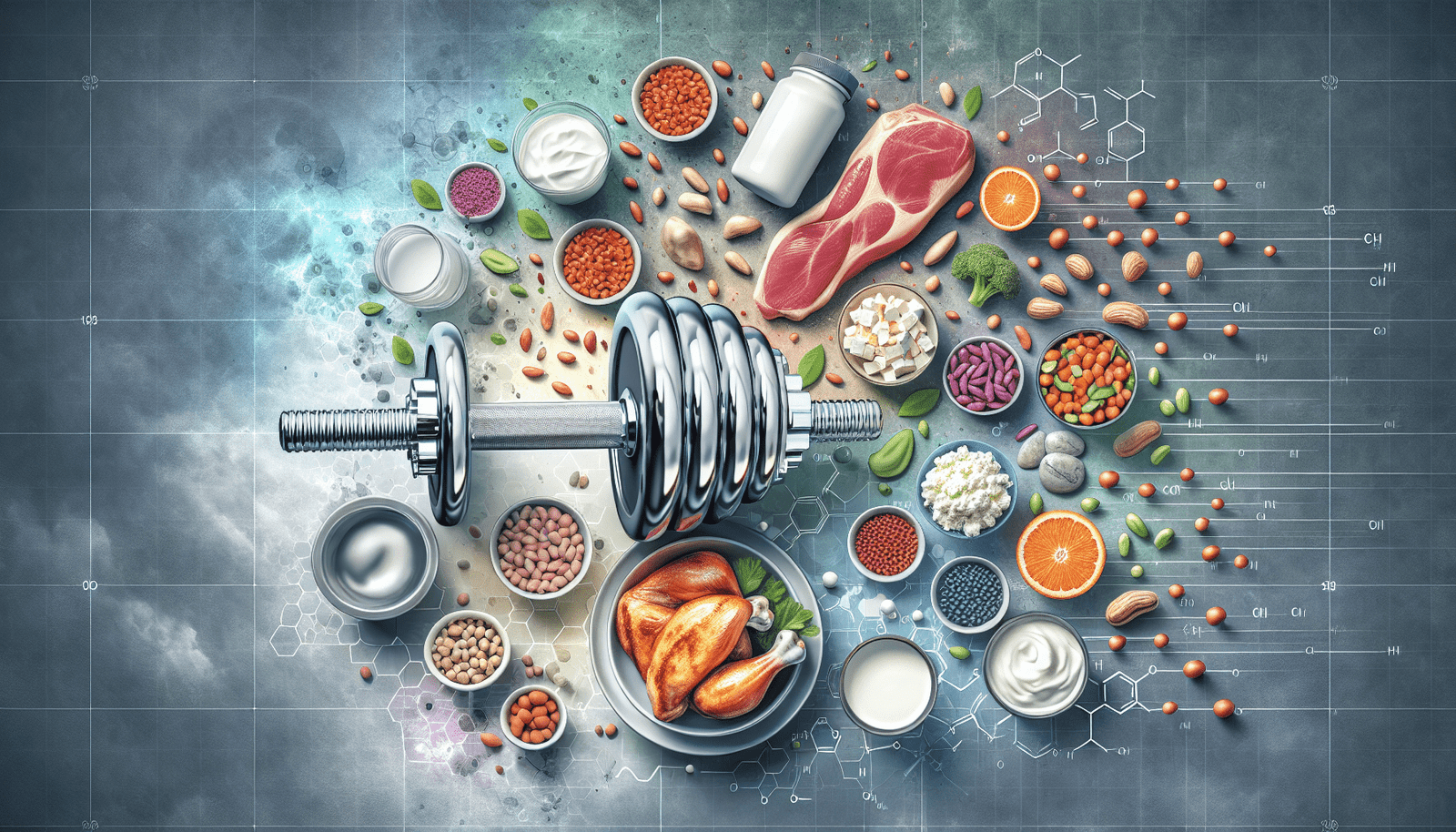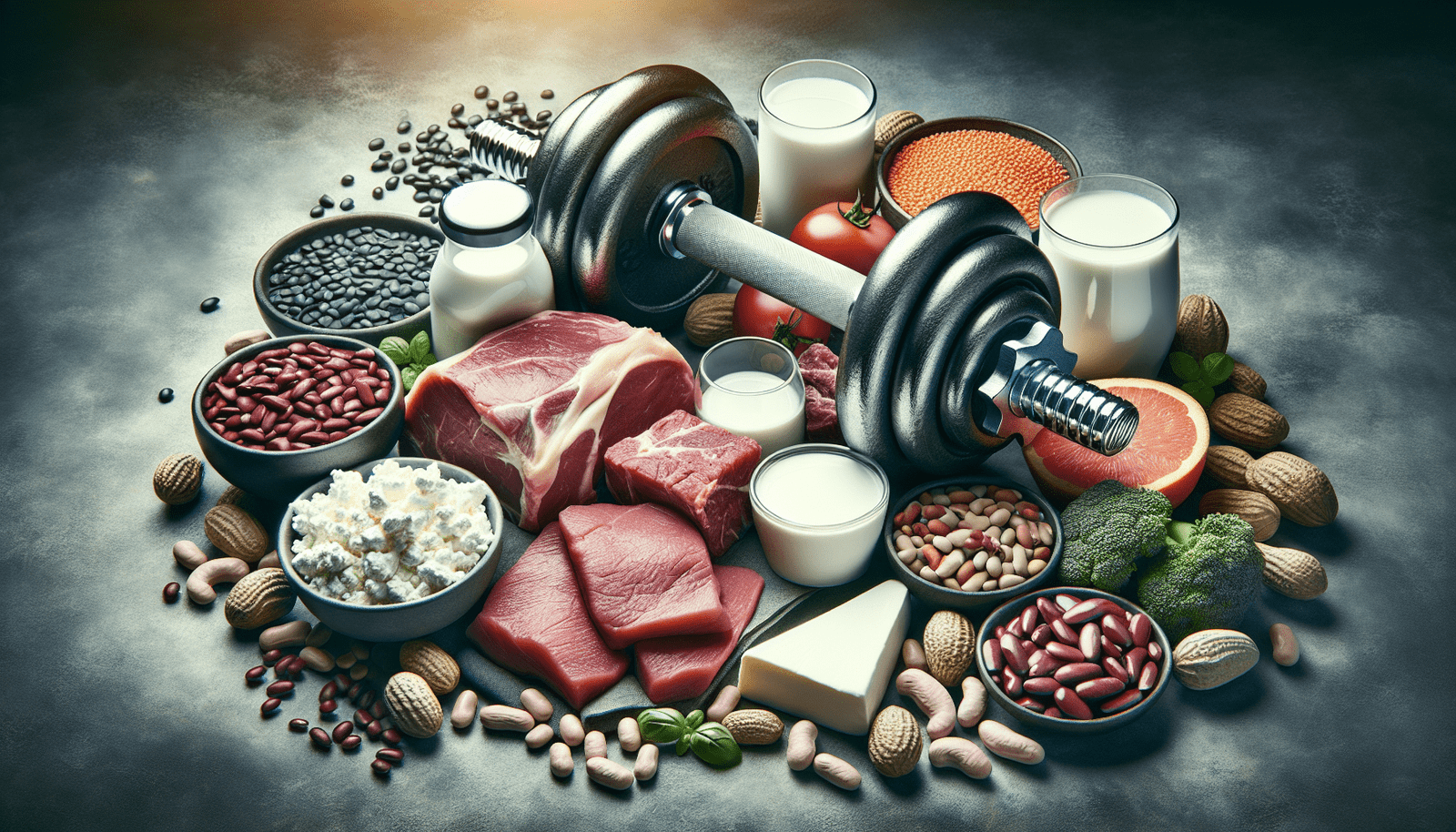Understanding How Much Protein is Required to Build Muscle Mass
If you’re keen on building muscle mass, it’s critical to comprehend the role of protein in your fitness journey. “Understanding How Much Protein is Required to Build Muscle Mass” provides an all-encompassing view on this topic. It helps you understand the science behind muscle-building and reveals how much protein is actually necessary to stimulate muscle growth effectively. This article comes handy with an insightful FAQ that patrols through the widely asked queries in the fitness niche. Gain some valuable knowledge and tips on muscle build-up and protein intake, inspired by experts’ advice and empirical research. Let yourself be your own dietitian and fitness coach. It’s high time you sculpted your body the way you aspire.

Understanding the Role of Protein in Muscle Building
Whether your goal is to shred fat, gain lean muscles, or improve overall fitness, protein is an indispensable part of your diet. Essentially, it’s a macro-nutrient that serves as the building block for our muscles. Let’s dive in a bit deeper and understand its role.
Significance of Protein in Muscle Growth
You see, when you exercise, you cause small tears in your muscle fibers. This is where protein comes into the picture. It helps repair these tears, allowing your muscles to grow stronger and larger. It’s not confined merely to muscle repair, though. The amino acids, the building blocks of protein, are critical to the synthesis of muscle protein and tissues, thus facilitating muscle growth.
How Protein Aids in Muscle Repair and Recovery
Post-workout, your body strives to repair the muscle damage caused during exercise. Here, protein helps expedite the recovery process. Consuming protein after a workout supplies the body with amino acids that can quickly repair tissues, alleviate muscle soreness, and facilitate optimal recovery.
Difference between Protein and Other Macronutrients in Muscle Building
Unlike fat and carbohydrates, protein isn’t a primary source of energy. It’s a builder. Consider fat and carbohydrates as your body’s fuel, and protein as the resource that repairs and builds your body’s muscle tissues.
Calculating Protein Needs for Muscle Mass Gain
Guessing games don’t work here. Knowing how much protein you need plays a crucial part in your muscle mass gaining goals.
Formulas and Guidelines for Protein Intake
Research suggests that an average sedentary man should take 56 grams, and a woman 46 grams of protein each day. But, when your goal is muscle gain, you might want to upscale. Typically, 1.2 to 2.2 grams of protein per kilogram (0.5 – 1 gram per pound) of body weight should do the trick.
How Body Weight and Activity Level Impact Protein Requirement
Your protein requirements also depend substantially on factors like your weight, activity level, and fitness goals. The more you weigh, and the more active you are, the more protein you need.
Adjusting Protein Intake Based on Fitness Goals
Remember, there’s no one-size-fits-all. Your fitness goals play a pivotal role in determining your protein needs. For instance, if your goal is weight loss, a higher protein intake can boost your metabolism and reduce appetite. However, someone looking to bulk up and build muscle mass would require slightly more protein.
Types of Protein Sources
Remember, all protein isn’t created equal. Hence, choosing the right type for your muscle-building goals is crucial.
Animal-Based Protein Sources
Animal-based proteins, such as chicken, beef, eggs, and milk, are packed with essential amino acids that your body needs for muscle growth and recovery.
Plant-Based Protein Sources
Plant-based proteins include items like beans, legumes, nuts, seeds, and certain grains. They are typically lower in some essential amino acids, but combining different plant-based proteins can provide all the amino acids your body needs.
Protein Supplement Options
Protein supplements, like protein powders or bars, can be a convenient way to increase your protein intake. They should be used to supplement a balanced diet, not replace it.
Ideal Protein Intake Timing for Muscle Gain
Protein timing is as important as intake and type. So when exactly should you consume protein?
The Concept of Protein Timing
The ‘anabolic window,’ the period after a workout when protein synthesis can be maximized, is a crucial time for protein intake. The belief is that consuming protein within this window can optimize recovery and muscle growth.
Optimizing Protein Intake Around Workouts
Around workouts, a meal containing both protein and carbohydrates is ideal. Consuming a complete protein source before and after training can provide the necessary amino acids to facilitate muscle recovery and growth.
Impact of Protein Intake Before Bed on Muscle Growth
Having a casein protein source before bed can also be beneficial. Casein slowly releases amino acids, thus allowing the body to continue muscle repair through the night.

Understanding Protein Quality and Absorption
Basically, how well your body makes use of protein is dictated by its quality and your body’s absorption ability.
Digestion and Absorption of Different Protein Types
Proteins are digested in the stomach and intestines and must be broken down into amino acids to be absorbed. Different types of proteins are absorbed at varying speeds, which can impact muscle recovery and growth.
Protein Quality Scores: BV, PDCAAS, DIAAS
Protein quality scores – Biological Value (BV), Protein Digestibility Corrected Amino Acid Score (PDCAAS), and Digestible Indispensable Amino Acid Score (DIAAS) – help determine the quality of a protein source.
Impact of Protein Quality on Muscle Gain
High-quality proteins that contain all essential amino acids promote better muscle protein synthesis and growth than lower-quality proteins.
Beneficial Combinations of Protein with Other Nutrients
Well, protein doesn’t work alone. Teaming it with the right nutrients can boost its efficiency.
Combining Protein with Carbohydrates for Muscle Gain
When consumed together, protein and carbs can lead to greater muscle protein synthesis than when consumed separately. The carbs help replenish muscle glycogen stores, while the protein aids in muscle repair.
Role of Fats in Conjunction with Protein
Although fats don’t directly aid in muscle growth, they are essential to maintain healthy hormone levels and absorb fat-soluble vitamins. A balanced intake of fats can support overall health and aid in muscle recovery and growth.
Importance of Hydration and Protein Digestion
Water plays an essential role in digesting and absorbing nutrients, including protein. Staying hydrated can thus ensure that your body can maximize the benefits of protein.

FAQs on Protein Intake and Muscle Building
Is There Such a Thing as Too Much Protein?
As they say, too much of anything is harmful. Consuming an excess of protein can put a strain on the kidneys and may lead to nutrient imbalances. Stick to the recommended daily intake for safe and beneficial consumption.
Should I Consume Protein Even on My Rest Days?
Yes! Muscle recovery and growth don’t stop on rest days. So consuming an adequate amount of protein, even on non-training days, can benefit muscle building.
What is the Difference Between Complete and Incomplete Proteins?
Complete proteins contain all essential amino acids, while incomplete proteins lack one or more of these. Animal-based proteins are usually complete, while plant-based proteins may be incomplete.
Impact of Protein Deficiency on Muscle Growth
Depriving your body of enough protein can lead to different problems, especially if you’re training to build muscle mass.
Symptoms of Protein Deficiency
Signs of protein deficiency range from muscle soreness, loss in muscle mass, to decreased strength and impaired performance.
Effects of Protein Deficiency on Athletic Performances
Lesser protein means your body’s muscle recovery and growth are hampered, leading to decreased athletic performance.
How to Rectify Protein Deficiency
If you’re suffering from protein deficiency, increasing your intake through diet or supplementation can help overcome the deficiency.

Understanding Proteins Effect on Natural Hormonal Processes
Protein does more than just repair and build muscles. It also influences some of the critical players in muscle growth, i.e., hormones.
Proteins Effect on Testosterone Level
Consuming an adequate amount of protein can maintain healthy levels of testosterone – a hormone that plays a vital role in muscle growth.
Protein Intake and Growth Hormone Production
Protein triggers the release of growth hormone, which aids muscle growth and recovery.
Protein’s Role in Muscle Protein Synthesis Through mTOR Activation
Protein intake activates the mTOR signaling pathway, which regulates muscle protein synthesis, a critical process for muscle growth.
Practical Tips for Meeting Protein Requirements
As you understand the importance of protein, here are some practical tips to ensure you nail your daily requirement.
Incorporating High Protein Foods in Everyday Meals
From cottage cheese at breakfast, chicken for lunch, to a lentil soup for dinner, there are endless options to include protein in all your meals.
Balancing Protein Intake Across All Meals
As protein can’t be stored in our body, try to evenly distribute your intake across all your meals.
Managing Protein Intake on a Budget
Lots of budget-friendly protein sources like eggs, beans, and legumes can help you meet your protein needs without breaking the bank.
In the end, remember muscle building is a journey. Give your body the time and nutrients it needs. Prioritize protein, but don’t overlook the importance of a balanced diet and consistent training. Happy muscle building!


Pingback: Determining the Correct Amount of Carbs Per Day for Muscle Building – Lose Weight With Absolute Minimal Diet – Your All In One Guide to Weight Loss & Nutrition
Pingback: Understanding How Long it Takes for Your Body to Build Muscle – Lose Weight With Absolute Minimal Diet – Your All In One Guide to Weight Loss & Nutrition
Pingback: A Comprehensive Guide on How to Build Your Dog’s Muscle – Lose Weight With Absolute Minimal Diet – Your All In One Guide to Weight Loss & Nutrition